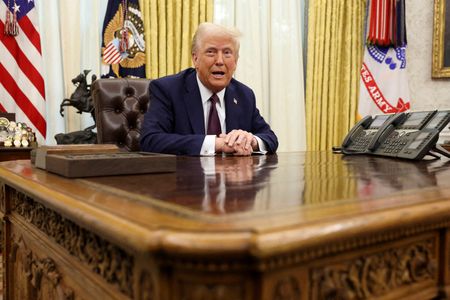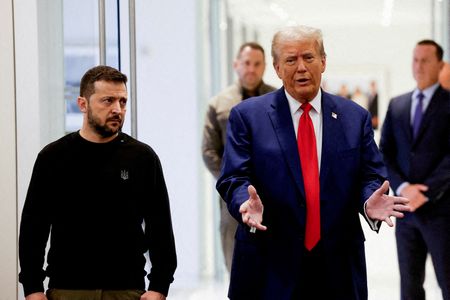By Jarrett Renshaw and David Morgan
WASHINGTON (Reuters) – President Donald Trump said on Friday he plans to announce reciprocal tariffs on many countries next week, a major escalation of his trade war.
Trump did not identify which countries would be hit but suggested it would be a broad effort that could also help solve U.S. budget problems.
“I’ll be announcing that, next week, reciprocal trade, so that we’re treated evenly with other countries,” Trump said. “We don’t want any more, any less.”
The move would fulfill Trump’s campaign promise to impose tariffs on American imports equal to rates that trading partners impose on American exports.
Trump made the announcement during a meeting with visiting Japanese Prime Minister Shigeru Ishiba. He said auto tariffs remained on the table amid reports that the White House was weighing potential exemptions.
Trump told Republican lawmakers of his plans during budget discussions at the White House on Thursday, three sources familiar with the plan told Reuters. Trump and top aides have said they plan to use higher tariffs on foreign imports to help pay for extending Trump’s 2017 tax cuts, which independent budget analysts say could add trillions of dollars to the U.S. debt.
Increased tariffs could offset some of that cost, though they have only accounted for about 2% of annual revenues in recent years.
Trump announced tariffs of 25% on Canada and Mexico on Saturday but delayed them after a negative reaction from investors. The two largest U.S. trading partners agreed to increase enforcement efforts at the border, a top Trump priority.
Wall Street extended losses on Friday following the Reuters report of Trump’s discussion with lawmakers.
U.S. consumer sentiment dropped to a seven-month low in February, and attitudes soured among Republicans as households took stock of what they believe will be a surge in inflation from Trump’s tariffs.
Trump and his Republicans aim to unveil their ambitious tax and spending package this weekend. It faces a perilous path through Congress, where Republicans hold narrow majorities in the House of Representatives and the Senate. Republicans are expected to rely on arcane budget rules to bypass Democratic opposition, which will require them to work in lockstep.
Trump is due to have dinner with Senate Republicans on Friday and attend the Super Bowl with House Speaker Mike Johnson on Sunday.
In a confirmation hearing on Thursday, Trump’s U.S. trade representative nominee Jamieson Greer said other countries will need to reduce barriers to U.S. exports if they want to maintain access to the U.S. market, citing Vietnam in particular.
“I need, if I’m confirmed, to go to these countries and explain to them that if they want to enjoy continued market access to the United States, we need to have better reciprocity,” Greer said.
(Reporting By Jarrett Renshaw, Trevor Hunnicutt and David Morgan; additional reporting by David Lawder and Steve Holland; editing by Colleen Jenkins, Andy Sullivan, Deepa Babington and David Gregorio)








